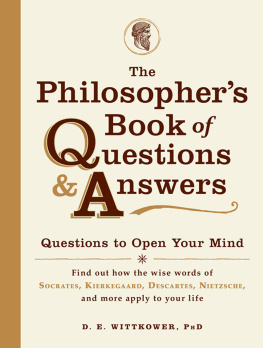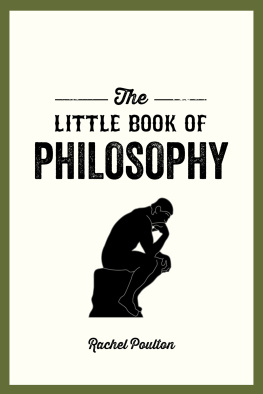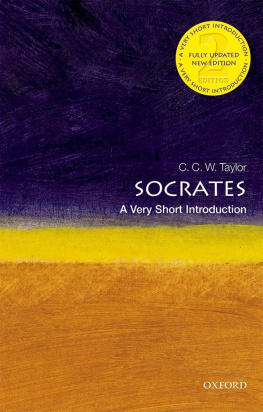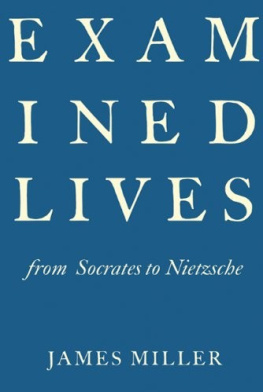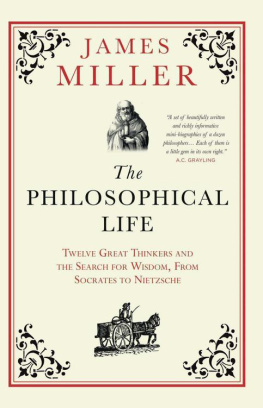INTRODUCTION

Philosophy.
The word itself means love of wisdom, and this characterizes well what philosophy is and why it is of constant relevance to us. Philosophy doesnt just seek knowledge; it tries to find the meaning and relevance of that knowledge. It seeks not just an understanding of what we are and what the world is, but an understanding of why things are the way they are, what difference it makes, and how we can know what is possible for us to know (and what is not). Philosophy is the mother of all other fields of knowledgephilosophy established the very idea of science, for example, and continues to ask the questions that science cannot answer: how science works, and what its limitations are. The same holds true for psychology, which can tell us a great deal about how the mind works, but stops short of asking what a mind ishere, psychology must return to the most fundamental questions, still within the realm of philosophy. Similarly, political science and economics can tell us many valuable things about the mechanics of governance and the management of social and natural resources, but we have to return to the open and boundless inquiry of philosophy to answer foundational questions about what is just and unjust, and about the moral and human values at stake in our treatment of one another, and of the environment.
Philosophers have played a declining role in our culture during the last century, and philosophers are not known and discussed figures like we have been in centuries past, but philosophical issues have become no less pressing and no less relevant. Too often today we turn to physicists to talk about the nature of reality and to sociologists and politicians to talk about moralityquestions that they will gladly admit are not the kinds of things that their tools and techniques are able to answer. Many people, though, still turn to philosophy to answer these philosophical issues, even though philosophers rarely appear on television or in magazines to help work through fundamental concerns of knowledge, morality, and faith.
This book is a contribution to the process of bringing philosophy back into public dialogue and personal exploration. I want to show here how the wisdom of the ancients and the speculation of contemporary philosophers can support your own engagement with the kinds of questions uniquely proper to philosophy: questions for which there are no clear and unambiguous answers, but which are of such great importance that we cannot but attempt to answer them anyhow.
Each entry in the book has two parts: on the first page, a few questions, and on the next, some philosophical discussion of the issues at play in the questions. There are several ways to work through the book. One is to try a daily routine: Sit down with the questions in the morning over coffee, think about them during the day and make time to write about them, and then explore the philosophy in the evening. On the other hand, you may want to sit down to explore an entry at a single sitting, maybe in a coffee shop. (Either way, coffee is obviously recommended.)
Another possibility is a book club or Socrates Caf approach. As indispensable as it is to try to get clarity for yourself in writing, philosophy is best done along with others. Do you have friends whom you like to explore ideas with, or do you enjoy talking through beliefs and perspectives with your partner? Discuss entries together, but be sure to set aside some time for individual writing as well; talking allows you to pass too quickly over complex problems, whereas writing can force you to confront the issues. You could also work through one of the eleven chapters by yourself and then get together with friends, maybe over drinks (besides coffee), to talk about your thoughts and reactions.
The ancient Greeks would get together over wine, present a philosophical issue, and each address it in turnwith some liquid stimulation. The Latin saying is in vino veritasthere is truth in winebut I might say more modestly drink responsibly, but think with abandon.
No matter what approach you take, the book will work best if you go through the entries in orderthey build from one to the next to develop different aspects of each topic.
A Note on Content
The topics here are extremely varied but not comprehensive. If you have some background in philosophy, you might notice an emphasis on Continental rather than Analytic or Pragmatic traditionsmy own training is very broad, both historically and across these different traditions, but I do favor Continental philosophy and also often found that many exciting ideas in Analytic philosophy were too situated within technical concerns to be able to ask open and easy-to-discuss questions about. You might also notice, among the religious questions, an emphasis on Christianity. This reflects the history of Euro-American philosophy rather than any view of mine or any implied claim about whats important to consider carefully, and Ive tried to present things so that these questions are valuable to people of a variety of faiths, or of no faith.
The questions will sometimes be ambiguous. They will sometimes be frustrating, or leading. Some will have easy answers that are hard to explain, whereas some will be difficult to come to grips with. This is on purpose. This isnt a classtheres no right answer that youre supposed to getand philosophically valuable questions can be valuable precisely because of what you have to go through to get to an answer. In writing these questions, my goal has been to give you a challenge and a direction for thought and discovery. I am not always playing nice, or even playing fair.
The answers here are often not answers at all. I think thats appropriate: These issues wouldnt be philosophical issues at all if there were definitive answers. The perspectives Ive included were not necessarily chosen because I think they are right, or because I think youll find them convincing, although that is certainly sometimes the case. They are chosen primarily because theyre significant, plausible, and challengingin short, worth working with and working through.
Enough preliminaries. Have fun.
CHAPTER 1

